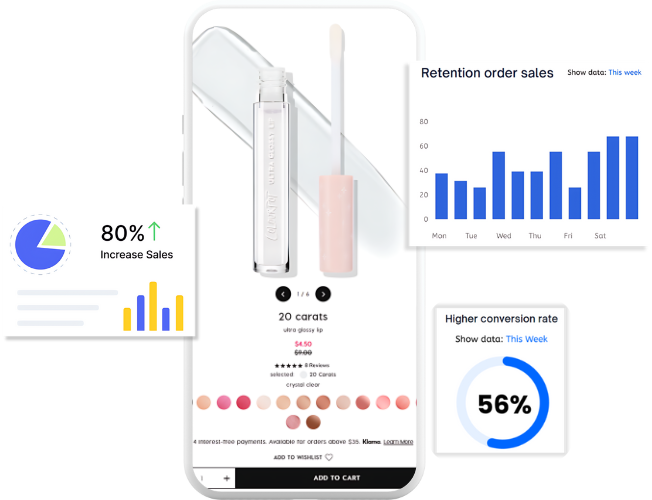What is a Shopify Multi-Vendor Marketplace App?
A Shopify multi-vendor marketplace app transforms e-commerce shops into dynamic marketplaces. Sellers join, creating their profiles and listing products. Meanwhile, you oversee operations, set commissions, and monitor sales. Simple yet powerful, it diversifies your offerings and enhances the overall shopping experience.
What are some other benefits of using a multi-vendor marketplace app?
- Efficient inventory management: Instead of juggling stock on your own, vendors handle their inventory. You gain a dynamic catalog without the storage headaches.
- Operational ease: The app automates many processes, from vendor registrations to commission splits. Less manual work, more streamlined operations.
- Leveraged marketing efforts: With multiple vendors promoting their storefronts, your platform garners wider attention. A collective promotional push benefits everyone involved.
- Community building: A multi-vendor platform fosters a sense of community. Sellers connect exchange strategies, and learn from one another, creating a support network tied to your brand.
Top 8 Shopify Multi-Vendor Marketplace Apps in 2025
When it came to ranking the top 8 Shopify multi-vendor marketplace apps, we focused on key criteria to find the best:
- Ease of use: The best apps keep things simple. If it has an uncomplicated setup and is easy to navigate, it caught our eye.
- Features: Beyond just allowing multiple vendors, we looked for apps that offer standout features. Think vendor dashboards, sales tracking, and payout systems. These features transform a basic app into an essential tool.
- Integrations: A great app plays well with others. We value options that connect smoothly with other e-commerce tools. This ensures your store runs without a hitch.
- Pricing: It’s not always about finding the cheapest. We wanted apps that offer solid features without breaking the bank. After all, quality and affordability should go hand in hand.
- Customer support: Setting up is just the beginning. We favored apps with strong support teams, ready to help when challenges pop up.
Our aim was more than just creating a list. We focused on highlighting tools that can truly transform your store into a dynamic marketplace that attracts vendors from various industries.
1. Multi-Vendor Marketplace

Customer Rating: 4.6/5 (over 691 reviews)
Key Features
Regarded by many as the best multi-vendor marketplace app for Shopify, this tool simplifies the process of adding vendors (sellers) and keeps track of their sales. An informative home page provides a snapshot of all the activities on the marketplace, whereas third-party connectors facilitate the integration of additional features to enhance the marketplace functions. Plus, Multi Vendor Marketplace lets sellers create informative profile pages to build trust with consumers.
Multi-Vendor Marketplace also offers:
- Individual and global commission rates for optimized payouts
- Product sync from various platforms (Shopify, WooCommerce, Magento, Prestashop)
- The option to assign existing products to sellers
Pros & Cons Table
| Pros | Cons |
|
|
Integrated with Other Popular Shopify Apps:
Booking App, Product Auction App, Lightning Deals, UPS Shipping, Crowd Funding, pwafy ‑ mobile app
Pricing Plans
Multi Vendor Marketplace offers three pricing plans:
- Basic: Costs $10/month for 3 active sellers, unlimited products, and more.
- Executive: Costs $30/month for 10 active sellers and everything in the Basic plan.
- Pro: Costs $45/month for unlimited sellers, everything in Executive, white labeling, and more.
You also get a 15-day free trial to experience every feature of the app before you sign up for a plan.
2. Shopify Marketplace Connect

Customer Rating: 4.5/5 (over 1,195 reviews)
Key Features
As a robust multi-vendor e-commerce platform, Shopify Marketplace Connect (previously Codisto) has all the bells and whistles. You can use it to reach customers across all renowned marketplaces like Etsy, Walmart, Amazon, and eBay. With easy-to-use features, the app makes it seamless to synchronize and manage inventory, orders, and listings.
Shopify Marketplace Connect also offers:
- Flexible fulfillment to enhance the order experience
- Built-in currency converter to sell in every marketplace category
- Shopify catalog listing in multiple marketplaces to streamline inventory management
Pros & Cons Table
| Pros | Cons |
|
|
Integrated with Other Popular Shopify Apps:
Etsy, Walmart, eBay, Amazon
Pricing Plans
This app is free to use for up to 50 orders each month. Beyond this threshold, the creator charges a 1% additional fee per order per month (with $99 being the cap).
3. ShipTurtle Marketplace Creator

Customer Rating: 4.6/5 (over 34 reviews)
Key Features
ShipTurtle streamlines your journey to a robust multi-vendor marketplace. It efficiently handles vendor store integration, product catalog imports, order dispatch, and tracking. Every vendor benefits from a dashboard, echoing Amazon’s Seller Central’s user-friendliness. Beyond its robust features, Shipturtle offers customization tools to drive brand recall and generate loyalty.
ShipTurtle also offers:
- Bulk invoicing and automation to speed up order processing
- Real-time vendor site sync for up-to-date listings
- Easy payouts with Stripe and PayPal integration
Pros & Cons Table
| Pros | Cons |
|
|
Integrated with Other Popular Shopify Apps:
Easypost, Amazon Shipping, FedEx, USPS, Royal Mail, Stripe
Pricing Plans
ShipTurtle Marketplace Creator has three price plans:
- Startup: Costs $19/month for 25 vendors, 1000 products, unlimited orders, and 2 shipper integrations.
- Business: Costs $39/month for 50 vendors, 5000 products, bulk actions, and 4 shipper integrations.
- Enterprise: Costs $69/month for unlimited vendors and shippers, plus 10,000 products.
A 14-day free trial is also available. This means you can test the app without committing anything upfront.
4. Onport-Marketplace & Dropship

Customer Rating: 4.3/5 (over 23 reviews)
Key Features
Does the thought of handling backend marketplace operations overwhelm you? Then Onport might be the perfect choice for your needs. This intelligent tool handles everything from software to marketplace integrations without requiring any input. Of course, you still get control of front-end functions like catalog listing, inventory management, and return processing.
Onport also has other key features to help marketplace retailers and drop-shippers, including:
- Payment automation for efficient commission and rate management
- Shipping workflows for calculating the most effective rates
- Order routing for splitting and syncing orders with the right vendors
Pros & Cons Table
| Pros | Cons |
|
|
Integrated with Other Popular Shopify Apps:
Shippypro, Stripe, PayPal, Shippo, USPS
Pricing Plans
The app itself is free to install. After installation, you can book a free discovery call with OnPort’s sales team to find the right pricing package for your business.
5. Vendor Payout – MultiVendor

Customer Rating: 4.8/5 (over 62 reviews)
Key Features
Does your business deal with multiple vendors? Do you have a difficult time managing all the payments? If you answered yes to these questions, then Vendor Payout is the right app for your operations. Not only does it make payouts hassle-free via automated workflows, but it also gives you a granular overview of sales, profits, and payouts in a single, intuitive dashboard.
Additionally, the Vendor Payout provides:
- An exclusive vendor login where sellers can manage inventory and sales in real-time
- Monthly payout automation via PayPal payout
- The option to apply discounts with different rates to your payouts
- Custom reports with filters like dates, products, and order status
Pros & Cons Table
| Pros | Cons |
|
|
Integrated with Other Popular Shopify Apps:
NA
Pricing Plans
Vendor Payout – MultiVendor offers three price plans:
- Lite: Costs $30/month for 50 vendor syncs plus dashboard reports.
- Standard: Costs $60/month for unlimited vendor sync plus additional dashboard reports.
- Pro: Costs $150/month for unlimited vendor sync plus additional dashboard reports.
The developer also offers a 7-day free trial, making it risk-free to test the various functions of the app.
6. Vendor Consignment

Customer Rating: 4.6/5 (over 42 reviews)
Key Features
For e-commerce entrepreneurs running a consignment business, Vendor Consignment acts as an ally. The app streamlines vendor interactions by helping you create accounts with ease. You can also monitor products, adjust commissions, and mold the app to your liking. Free onboarding and support ensure merchants can navigate the platform confidently from day one.
Additionally, Vendor Consignment provides:
- Vendor portal white labeling for a memorable experience
- Payout recording and PayPal integration (outside Canada)
- Reports for all key metrics
Pros & Cons Table
| Pros | Cons |
|
|
Integrated with Other Popular Shopify Apps:
PayPal
Pricing Plans
Vendor Consignment has just one price plan:
Pro: $24.99/month for unlimited vendors, reports, and all other features.
A 14-day free trial is also available in case you want to test the app before adding it to your toolkit.
7. Puppet Vendors

Customer Rating: 4.9/5 (over 93 reviews)
Key Features
The Puppet Vendors streamlines vendor management, especially for those in the consignment space. Real-time tracking of sales and commissions? Check. The app sends orders directly to vendors through email and a web portal. Vendors get their own space to oversee products and inventory. Plus, data-driven insights aid in refining business strategies. Whether you run a multi-brand marketplace or deal with digital art and templates, PuppetVendors fits right in.
Additionally, Puppet Vendors offers:
- Centralized view of vendor details, payouts, and reporting
- Percentage or flat-based deductions and commissions
- Packing slips and invoicing to streamline shipping activities
Pros & Cons Table
| Pros | Cons |
|
1. Not as robust as other apps |
Integrated with Other Popular Shopify Apps:
Web Portal, Email
Pricing Plans
The Puppet Vendors offers three price plans:
- Basic: Costs $19/month for 30 vendors, real-time notifications, and more.
- Business: Costs $49/month for 100 vendors, all from the Basic plan, and unlimited email & chat support.
- Enterprise: Costs $99/month for 101-300 vendors, all from the Business plan, and first onboarding + setup.
You can also take advantage of the 14-day free trial to test the salient features of the app before committing to a purchase.
8. Omnivore for Marketplaces

Customer Rating: 4.3/5 (over 24 reviews)
Key Features
Omnivore simplifies your e-commerce strategy. With one app, you can connect several marketplaces to your Shopify store. Manage your listings, control inventory, and adjust prices seamlessly. Instead of juggling multiple tools, you get a consolidated sales view. And, whenever guidance is needed, an expert team stands ready to assist.
Additionally, Omnivore lets you:
- Tailor product attributes and descriptions (think Amazon bullet points) for each platform
- Review and optimize all marketplace activity via one dashboard
- Use existing Shopify methods to fulfill marketplace orders
Pros & Cons Table
| Pros | Cons |
|
|
Integrated with Other Popular Shopify Apps:
Amazon, Trade Me, eBay, Kogan, TheIconic, Catch
Pricing Plans
Omnivore for Marketplaces offers just one plan:
- Multi-Marketplace: Costs $74.95/month or 1% of sales, whichever is greater
It also offers a generous 30-day trial, giving you ample time to test the app without making any commitments.
Conclusion
That brings our roundup of the best Shopify multi-vendor marketplace apps to a close. Each option is designed to turn your Shopify store into a vendor-bustling marketplace. By choosing the right app for your store, you can generate higher revenue streams and gain an edge over your competitors.
FAQ About Best Shopify Multi Vendor Marketplace Apps
Note: This blog was originally written in English and translated using an automated tool to make the content accessible to a global audience. We believe in sharing valuable insights with everyone and apologize for any inaccuracies. If you spot any errors, please feel free to contact us for corrections. Your feedback helps us improve and ensures the content’s value is fully realized.





